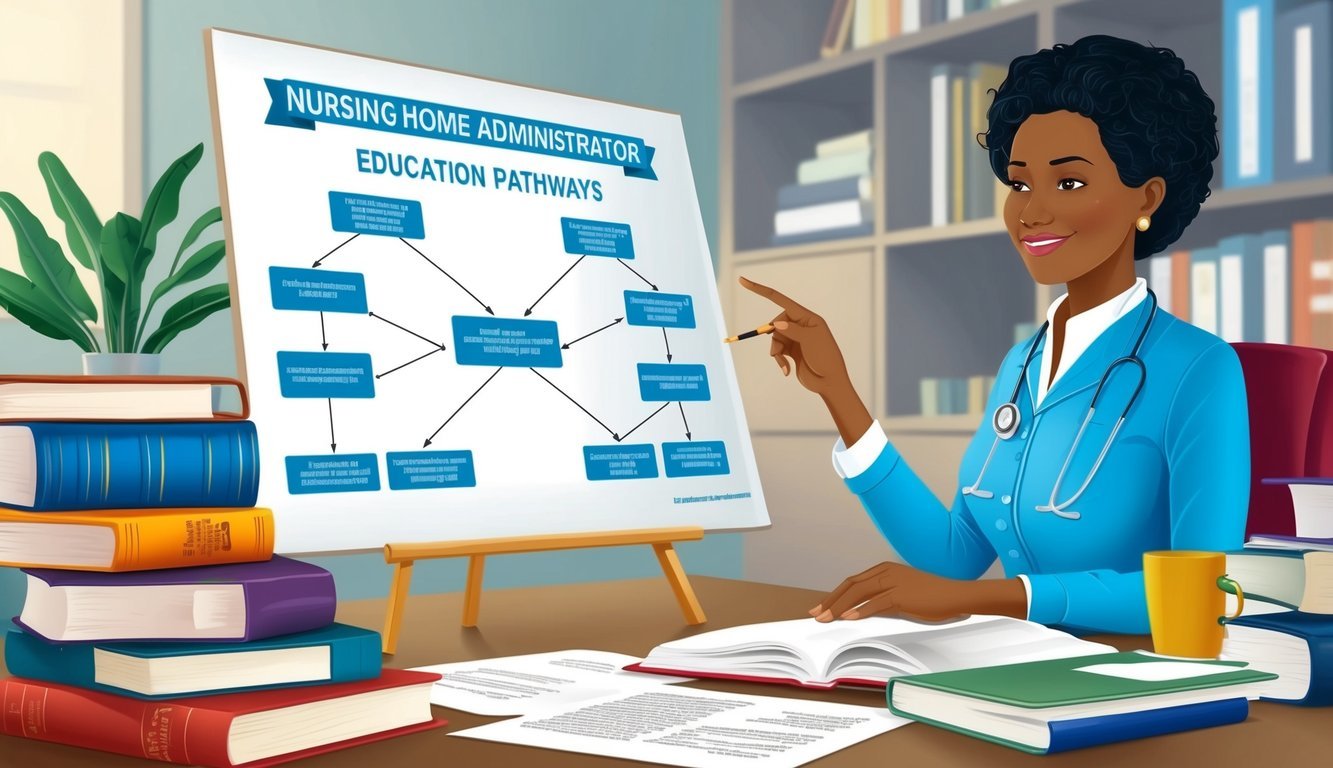Becoming a nursing home administrator is a rewarding career path for those looking to make a significant impact in long-term care.
To start, you will need a bachelor’s degree in nursing, healthcare administration, or a related field, followed by the completion of a national licensure exam.
This role involves overseeing the overall management of a facility while ensuring compliance with state and federal regulations.
In addition to educational requirements, this position demands strong leadership and financial management skills.
You will be responsible for the well-being of residents and managing the facility’s budget.
Understanding the complexities of healthcare regulations and the needs of a diverse resident population is crucial for success in this role.
If you’re interested in pursuing this career, there are numerous resources available to guide you through the educational and licensing processes.
Explore opportunities for further education and training through platforms like Nurse.org and MHA Online to help you embark on this fulfilling journey.
Education Pathways for Nursing Home Administrators

To pursue a career as a nursing home administrator, it is essential to understand the various educational pathways available.
The journey typically begins with a foundational degree and can extend to advanced specializations in healthcare management.
Understanding the Educational Foundation
Your journey starts with the basic educational requirements for nursing home administrators.
A bachelor’s degree in healthcare administration or a related field is often essential.
This degree will equip you with fundamental knowledge in areas like healthcare management, finance, and ethics.
Many programs include courses specific to gerontology, which focuses on the aging population.
This foundational knowledge prepares you for the complexities of managing a nursing facility.
Organizations may seek candidates who not only have educational qualifications but also a strong understanding of the needs of residents.
Bachelor’s Level Education
A bachelor’s degree in healthcare administration is the most common starting point.
Programs typically cover important topics such as:
- Health care management
- Finance and budgeting
- Human resources
- Ethics in health care
You can find universities that offer specialized degrees focusing on nursing home administration.
Some programs may also provide internships, giving you real-world experience critical for job readiness.
Courses in communication, leadership, and regulatory issues affecting nursing homes will also be essential.
It’s advisable to choose a program accredited by relevant bodies to enhance your qualifications.
Advanced Degrees and Specializations
Pursuing an advanced degree can significantly enhance your career prospects.
Options include the Master of Healthcare Administration (MHA) or a Master of Science in Gerontology.
These programs delve deeper into management principles and policies impacting long-term care facilities.
Specializing allows you to focus on specific aspects of nursing home administration, such as:
- Financial management
- Health policy
- Long-term care management
Advanced education often includes a thesis or capstone project, requiring you to apply what you’ve learned in practical settings.
Completing an advanced degree not only provides a competitive edge but may also be necessary for higher-level positions in some states.
Licensure and Certification
Obtaining proper licensure and certification is crucial for your career as a nursing home administrator.
It involves meeting various national and state requirements, preparing for the licensing examination, and committing to ongoing professional development.
National and State Requirements
To become a licensed nursing home administrator (NHA), you must fulfill both national and state-specific requirements.
The most common pathway involves obtaining a bachelor’s degree in health administration, nursing, or a related field.
| Requirement | Description |
|---|---|
| Education | Bachelor’s degree in relevant fields (e.g., healthcare administration) |
| Experience | Some states require administrative experience in a long-term care setting |
| Examination | You must pass the Nursing Home Administrator Licensing Examination (NAB) |
The NAB is a national exam, but states may have additional criteria.
Always check your state’s licensing board for specific requirements to ensure compliance.
Preparing for the Nursing Home Administrator Licensing Examination
The Nursing Home Administrator Licensing Examination assesses your understanding of various aspects of nursing home management.
To prepare effectively, consider these steps:
- Study Material: Obtain study guides that cover key topics such as regulatory compliance, management principles, and resident care.
- Study Groups: Join or form study groups with peers preparing for the exam. This can enhance understanding and retention of material.
- Practice Exams: Take practice exams to familiarize yourself with the format and types of questions asked.
Utilizing resources from the National Association of Long Term Care Administrator Boards (NAB) can provide sample questions and additional preparation tips.
Continuing Education and Professional Development
Once you obtain your nursing home administrator license (LNHA), maintaining it requires ongoing education and professional development.
States typically mandate continuing education hours to ensure you stay updated on industry changes.
- CEU Requirements: Know your state’s continuing education unit (CEU) requirements. Most states require 10-20 hours annually.
- Courses: Enroll in relevant courses that focus on regulatory updates, leadership skills, and advancements in resident care.
- Networking: Attend industry conferences, webinars, and workshops. These opportunities not only provide learning but also help expand your professional connections.
By committing to continued education, you enhance your credentials and improve the quality of care within your facility.
Operational Knowledge and Skillsets
To effectively manage a nursing home, you need a diverse set of skills and knowledge areas.
This section focuses on management and leadership, regulatory compliance, and financial and human resources management, which are critical for your success as a nursing home administrator.
Management and Leadership in Nursing Homes
Strong management and leadership skills are essential for a nursing home administrator.
You must effectively oversee daily operations while ensuring a positive environment for both residents and staff.
Key skills include:
- Communication: Clearly convey expectations and provide feedback to your staff.
- Team Building: Foster a collaborative atmosphere to encourage teamwork.
- Decision-Making: Make informed choices regarding resident care and facility management.
A well-rounded administrator should also possess the ability to adapt to changing circumstances and guide your staff through challenges.
Continuous professional development in healthcare leadership will enhance your effectiveness.
Explore resources like Nurse.org for further insights.
Understanding Regulatory Compliance
You must have a thorough understanding of state and federal regulatory guidelines governing nursing homes.
Compliance is crucial for maintaining accreditation and funding.
Important aspects to focus on include:
- Health and Safety Standards: Ensure that all operations meet established health guidelines.
- Staff Training: Regularly update training programs to comply with regulations.
- Documentation: Maintain accurate records to demonstrate compliance during inspections.
Knowledge of laws such as the Nursing Home Reform Act will help you navigate the landscape of regulatory requirements and ensure your facility’s success.
Financial and Human Resources Management
Effective financial management is crucial for sustaining operations and providing quality care.
Key areas to focus on include:
- Budgeting: Develop comprehensive budgets that allocate resources effectively.
- Cost Control: Monitor expenditures and implement cost-saving measures.
- Human Resources: Recruit, train, and retain qualified staff to deliver high-quality care.
Understanding the interplay between budgeting and healthcare services will enable you to allocate resources efficiently.
Familiarize yourself with financial tools and strategies to optimize your facility’s performance.
Resources like Indeed can provide valuable insights into the skills necessary for financial and human resources management.
Career Trajectories and Advancement

Pursuing a career as a nursing home administrator opens up various paths for advancement and specialization.
Understanding the specific roles, training programs, and the job market can help you navigate this career effectively.
Roles and Responsibilities in Long-term Care
As a nursing home administrator, you manage all operations within the long-term care facility.
This includes ensuring compliance with state and federal regulations, overseeing staff, and maintaining resident care standards.
Your daily tasks may involve budgeting, human resources management, and implementing policies that enhance the quality of care.
You also play a pivotal role in facilitating communication between residents, families, and healthcare professionals.
The position demands a blend of leadership and compassion, as you directly impact the lives of senior care residents.
Those who excel in this role can pursue positions such as regional director of operations or healthcare executive.
Administrator in Training Programs
Many aspiring nursing home administrators benefit from Administrator in Training (AIT) programs.
These initiatives provide hands-on experience under the mentorship of seasoned professionals.
AIT programs typically last six to twelve months and allow trainees to immerse themselves in the daily functions of a nursing home.
Participants gain valuable insights into operational management, regulatory compliance, and resident care logistics.
Successfully completing an AIT can lead to licensure opportunities and enhance your employability in this competitive field.
Look for programs accredited by the National Association of Long Term Care Administrator Boards (NAB) to ensure quality training.
Navigating the Job Market and Career Opportunities
The job market for nursing home administrators is projected to grow due to an increasing aging population.
Healthcare leaders increasingly seek professionals who can effectively manage long-term care facilities.
Your salary in this role can vary by location and facility size, but it typically ranges from $80,000 to $120,000 annually, with potential bonuses for performance.
Utilizing networking opportunities and professional organizations, such as the American Health Care Association (AHCA), can significantly enhance your career prospects.
Additionally, staying updated on industry trends will help you adapt and thrive in this evolving field while providing quality care for residents.
Special Considerations in Long-term Care

Navigating the complexities of long-term care involves understanding specific considerations that directly impact patient and resident well-being.
Key areas to focus on include gerontology and elder care, ethics in healthcare, and the role of technology in healthcare management.
Focus on Gerontology and Elder Care
In your role as a nursing home administrator, a solid grasp of gerontology is essential.
This field studies the aging process and the challenges faced by elderly individuals.
Understanding age-related changes and related health issues allows you to tailor care that meets the unique needs of residents.
Programs focusing on elder care should integrate both physical and emotional support systems.
This includes assessing cognitive functions and social engagement activities to enhance overall well-being.
Incorporating individualized care plans is crucial, enabling staff to address specific needs effectively, thereby promoting higher satisfaction among both residents and families.
Ethics and Quality in Patient and Resident Care
Ethical considerations are paramount in long-term care environments.
You must foster an atmosphere that prioritizes patient dignity, autonomy, and informed consent.
Establishing clear guidelines on ethical dilemmas ensures that your team is prepared to handle these sensitive situations competently.
Quality care hinges on consistent monitoring and evaluation of care practices.
Implementing regular staff training programs can help reinforce ethical standards and improve quality of care.
Utilizing feedback from residents and their families can provide additional insights, allowing you to refine practices and enhance the overall care experience.
Technological Advancements in Health Informatics
Health informatics is transforming the landscape of long-term care facilities.
Familiarizing yourself with new technologies can lead to significant improvements in both patient engagement and operational efficiency.
For instance, electronic health records (EHR) systems streamline the management of patient information.
This makes it easier for you and your staff to access and share vital data.
Incorporating telehealth options can also facilitate better communication with healthcare providers, ensuring timely interventions.
Additionally, staying updated with advancements in health informatics can empower you to implement systems that improve care coordination and enhance the quality of resident care.
By embracing these technologies, you create a more responsive and efficient environment for everyone involved.

